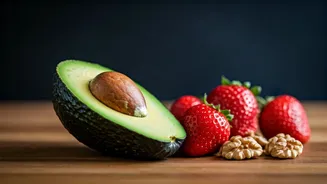Boosting Heart Health
Maintaining a healthy heart is critical to overall well-being, and diet plays a central role in this. The foods we consume directly impact the condition
of our blood vessels and our susceptibility to blockages. These blockages, often caused by the buildup of plaque, can lead to serious cardiovascular issues. By integrating certain foods into your diet, you can actively work towards preventing these issues. The emphasis on natural, whole foods is crucial because they provide essential nutrients. These elements work synergistically to provide benefits to your cardiovascular system. This includes reducing inflammation, lowering cholesterol, and improving blood flow. The following are five essential foods.
Fatty Fish Power
Fatty fish, such as salmon, mackerel, and sardines, are excellent sources of omega-3 fatty acids. These essential fats are celebrated for their anti-inflammatory properties, which are crucial for heart health. Omega-3s help to reduce the levels of triglycerides in the blood, lower blood pressure, and decrease the risk of blood clots. Studies have indicated that regular consumption of fatty fish can significantly lower the risk of heart disease. Aim to include at least two servings of fatty fish in your diet each week. Moreover, these fish are also rich in protein and vitamin D, further contributing to overall health. Consider grilling, baking, or steaming these fish to retain their nutrients and enjoy their natural flavors. This simple addition to your diet can make a significant difference in your heart's well-being.
Berry's Antioxidants
Berries, including blueberries, strawberries, and raspberries, are packed with antioxidants. These compounds help to protect your blood vessels from damage caused by free radicals. Free radicals are unstable molecules that can contribute to the development of plaque and inflammation. Antioxidants, such as those found in berries, neutralize these free radicals, reducing the risk of heart disease. Berries also contain fiber, which helps to lower cholesterol levels and improve digestion. The vibrant colors of berries are a sign of their high antioxidant content, making them both visually appealing and health-boosting. Consuming a cup of berries daily can be a delicious and effective way to support your heart health. They can be added to your breakfast, snacks, or even desserts.
Avocado's Role
Avocados are rich in monounsaturated fats, which are known to lower LDL (bad) cholesterol levels and increase HDL (good) cholesterol. They also provide fiber and potassium, which are beneficial for heart health. Potassium helps to regulate blood pressure, reducing the strain on the heart. The healthy fats in avocados help to reduce inflammation and protect the arteries from damage. Incorporating avocado into your diet can be as simple as adding it to salads, spreading it on toast, or including it in smoothies. While avocados are high in calories due to their fat content, they are packed with nutrients, making them a healthy and satisfying addition to your meals. The benefits of avocados extend beyond heart health.
Nuts and Seeds
Nuts and seeds, such as almonds, walnuts, flaxseeds, and chia seeds, are packed with heart-healthy nutrients. They contain healthy fats, fiber, and antioxidants, all of which contribute to cardiovascular health. Nuts and seeds can help lower LDL cholesterol, improve blood vessel function, and reduce inflammation. Flaxseeds and chia seeds, in particular, are excellent sources of omega-3 fatty acids. A handful of nuts or seeds per day is a great way to boost your nutrient intake. They can be added to salads, oatmeal, or enjoyed as a snack. Be mindful of portion sizes, as nuts and seeds are calorie-dense. Look for unsalted varieties to avoid excess sodium. This simple addition can significantly improve your heart health.














